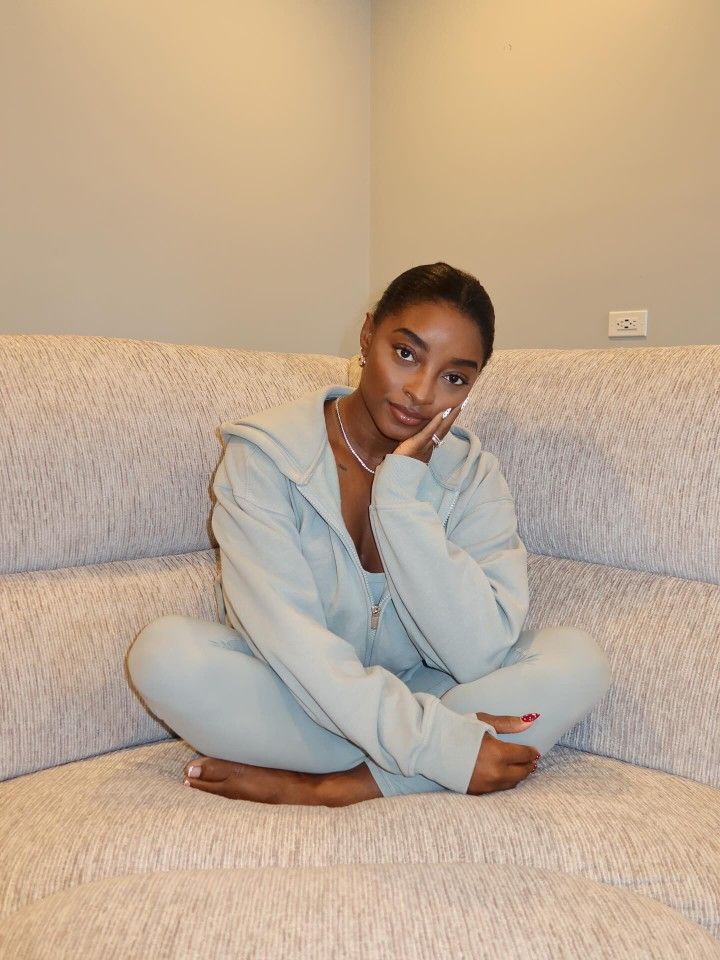
Simone Biles hasn’t ruled out competing in the 2028 Summer Olympics when the Games come to Los Angeles.
Biles, 28, who previously said it would be “greedy” of her to compete in 2028, shared some insight on her thoughts about another Summer Olympics run while speaking in Buenos Aires, where the most decorated U.S. gymnast in history was being honored by the city’s mayor Jorge Macri. “Everyone likes to talk about L.A. and what that road looks like for me,” Biles said. “So, currently, I am taking some time off from the gym because I think it’s really important that your physical health matches your mental health.”
The gymnast said prioritizing her mental health was what helped her make history in Paris. “That’s why you saw so much of my success in Paris, because the mental and the physical were right on par,” Biles explained. “They were right on track with each other, so I think that’s really, really important.” Biles said that while she’s still “not sure what 2028 looks like” for her, she will be at the Los Angeles Games “in some capacity.”
When you think of gymnastics greatness, one name instantly comes to mind: Simone Biles. The four-time Olympic gold medalist, who’s redefined what’s possible in gymnastics, might just have one more breathtaking chapter to write. In recent interviews, Biles hinted that she isn’t closing the door on a potential comeback at the 2028 Los Angeles Olympics—and fans everywhere are losing their minds. Let’s dive deep into what this could mean for her legacy, the sport, and the future of gymnastics.
Who Is Simone Biles? A Quick Refresher on the GOAT
Simone Biles isn’t just a gymnast—she’s a phenomenon. With 37 Olympic and World Championship medals, she’s the most decorated gymnast in history. Her explosive power, flawless technique, and fearless innovation have rewritten gymnastics textbooks.
Biles has become more than an athlete—she’s an icon of resilience, courage, and self-advocacy. From her Tokyo 2020 mental health stand to her stunning 2024 Paris comeback, she’s proven that true strength comes from knowing when to step back and when to soar again.
Simone Biles’ Recent Comeback: The Road to Paris 2024
After taking a step back during the Tokyo Olympics in 2021, many thought Biles’ competitive days were behind her. But in 2024, she shocked the world with a triumphant return, dominating the U.S. Championships and World events like she never left.
Her 2024 performance reminded everyone that Simone doesn’t just compete—she owns the floor, beam, vault, and bars. Each flip, twist, and landing screamed: “I’m still here.”
Why Simone Biles Isn’t Saying No to Los Angeles 2028
During a recent interview, Biles left the door slightly open for 2028:
“Never say never,” she said with a smile.
That simple statement was enough to send shockwaves through the sports world. Here’s why her words carry so much weight.
1. The Home Advantage
The Los Angeles 2028 Olympics will be on U.S. soil—a once-in-a-lifetime opportunity for Biles to perform in front of her home crowd. The atmosphere, the energy, and the symbolism of closing her career at home would be almost poetic.
2. Her Love for the Sport Never Fades
Even after all the gold medals and accolades, Biles’ passion for gymnastics burns bright. She’s often said that gymnastics still “feels like home,” and that she loves pushing boundaries.
That inner fire might be the biggest reason she’s not ruling anything out.
3. She’s Redefining Longevity in Gymnastics
Traditionally, gymnasts peak in their teens or early twenties. But Biles is shattering that stereotype. Competing successfully in her late 20s proves that elite gymnastics careers can last longer—if you have the discipline, mindset, and training innovation she embodies.
4. The Mental Health Factor
After bravely speaking out about her struggles with the “twisties” and anxiety during Tokyo, Biles became a powerful advocate for mental health in sports.
Now, she competes on her own terms—balanced, self-aware, and focused. That mental clarity could help extend her career even further.
Could Simone Biles Compete at 31? Absolutely.
By 2028, Biles would be 31 years old, which sounds “old” in gymnastics years—but let’s be honest, rules don’t apply to her.
She’s already shown that she can dominate even after stepping away for years. With advanced training methods, sports science, and her unmatched determination, age could become just another number.
What a 2028 Comeback Would Mean for Gymnastics
If Biles decides to compete in Los Angeles, it wouldn’t just be another Olympic run—it would be a cultural event. Here’s why.
Inspiring a New Generation
A 31-year-old Simone Biles competing at the Olympics would inspire millions—especially young gymnasts who think their careers have an expiration date. She’d prove that greatness evolves, it doesn’t expire.
Elevating Gymnastics Popularity in the U.S.
With the Games hosted in Los Angeles, Biles’ participation would skyrocket viewership, ticket sales, and youth participation. She’s not just a competitor; she’s a brand, an ambassador, and a beacon of excellence.
A Farewell Fit for a Legend
If 2028 does become her final bow, imagine the emotion: the crowd on their feet, the world watching, and Biles delivering one last gravity-defying routine. It would be a goosebump moment for the ages.
Simone’s Current Focus: Staying Grounded and Grateful
Despite the hype, Biles remains grounded. Her focus right now is maintaining her health, enjoying life with husband Jonathan Owens, and supporting future gymnasts.
In her own words:
“I’m taking it one step at a time. Whatever happens next, happens.”
That calm, balanced perspective might just be the secret ingredient to her sustained success.
Training Smart, Not Hard
Gone are the days of punishing routines and burnout. Biles has embraced smart training—prioritizing recovery, flexibility, and mental well-being as much as technical mastery.
Her approach could redefine how future generations train, proving that longevity and success can go hand-in-hand.
Fans React: The Internet Can’t Handle It
When Biles hinted at a 2028 return, social media exploded.
From TikTok edits to Twitter threads, fans are begging for “one more Olympics.” Some even call it the “Biles Redemption Tour.”
Memes, tributes, and fan edits aside—there’s a genuine sense of excitement. Everyone wants to witness one last legendary performance.
If She Competes, What Events Could We See Her In?
If Simone does decide to compete, she might focus on select events instead of the full all-around program—perhaps vault and floor, where she shines brightest.
That strategy could help preserve her body while still letting her showcase her signature skills—the Biles and Biles II that bear her name.
Legacy Beyond Medals
Even if she never competes again, Simone Biles’ impact is eternal. She’s transformed how the world sees gymnastics and mental health in sports. Her story is one of strength, self-love, and limitless potential.
But if she does return in 2028?
It’ll be the grandest encore in Olympic history.

Conclusion: Simone Biles’ Story Isn’t Over Yet
Simone Biles has already achieved everything an athlete could dream of—yet her hunger for growth remains. Whether she steps onto the mat in Los Angeles or not, her influence will echo for generations.
She’s more than the GOAT. She’s proof that courage, balance, and belief can take you beyond limits.
So, 2028? Never say never.
FAQs
1. Will Simone Biles compete in the 2028 Olympics?
She hasn’t confirmed it yet but hinted that she’s open to the idea. Fans are hopeful for a Los Angeles comeback.
2. How old will Simone Biles be in 2028?
She’ll be 31 years old—an impressive age for an Olympic gymnast, though her performance level suggests she could still compete with the best.
3. What are Simone Biles’ most famous moves?
Her signature moves include the Biles and Biles II—high-difficulty elements named after her on the vault and floor.
4. How did Simone Biles handle mental health challenges?
She took time off after Tokyo 2020 to focus on her well-being, returning stronger and more self-aware than ever.
5. What would her 2028 participation mean for gymnastics?
It would redefine longevity in the sport, inspire a new generation, and mark one of the greatest comeback stories in Olympic history.